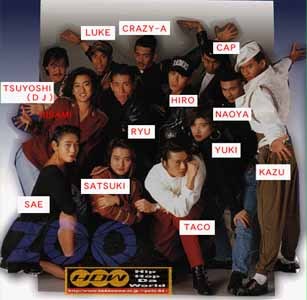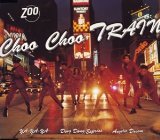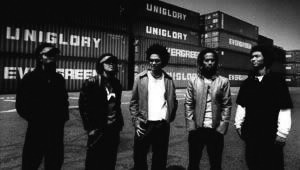HIRO began his career as part of a co-ed group named ZOO. This group came out from a dance TV show that started in the year 1989 called CLUB DADA (also known as DADA LDM, DADA, GROOVING SCENE DADA through its years of broadcast), which seemed to be inspired by the US’ show SOUL TRAIN, an Afro-American music dance show. The Japanese show showcased music and dance styles that were generated by genres such as Hip-Hop, Soul, R&B and Reggae. The show followed young boys and girls whom danced inside a club with a series of different performances from singers and dancers on the club stage. Some of this show’s dancers became members of ZOO, a large unit of dancers and a few vocalists who wouldn’t have a settled line-up until a year after the group’s debut. Although they started as 7 and kept adding people -becoming a 13-member group by the time they released the single Choo Choo Train in 1991- the final number of ZOO members was 10 (some of those members that were cut, were placed in another unit).

Members of ZOO:
TACO, dubbed the “Japanese Michael Jackson”, group’s leader and one of the vocalists.
MARK, performer.
NAOYA, performer.
LUKE, performer.
CAP, performer.
HIRO, performer.
SATSUKI, performer, vocalist and the center of the group.
SAE, performer.
HISAMI, performer.
MAMI, performer.
YU-KI, performer and vocalist.
Former Members:
KAZU, performer.
RYU, performer.
RIKAKO, performer.

During that decade (20th Century’s 1990’s), Hip-Hop and R&B started to become more mainstream in the US but Japan had already got its contact with those genres in the late 1970’s in an underground scene that became wide enough to get a better chance among the general audiences after the 1980’s Idol Golden Age, regardless of the Rock Bands’ Wave that hit the airwaves right after. ZOO lived during that period of time, debuting in the month of May of the year 1990 with the single Careless Dance, that had a strong “New School” of Hip-Hop and R&B-flavored sound but still with some influence and rhythms from the 1990’s Electronic and Dance music. The label FORLIFE was the house of the group and they still hold the rights for their songs. They even launched some compilation albums and remixes after the group’s dissolution in 1995.
ZOO had a limited success but left their mark, despite having such a short career. From 1990 to 1995 they released a total amount of 11 singles and 6 albums. Most of their singles title tracks were the openings and endings for the show they started with, like the songs Careless Dance, Native or Choo Choo Train, a song that later became one of EXILE’s anthems.
Albums:
NATIVE – July 21st 1991
Present Pleasure – December 15th 1991
Gorgeous – May 13th 1992
JUNGLE – December 16th 1992
Can I Dance? – November 19th 1993
ZOO PALAST – December 7th 1994
Singles:
Careless Dance –May 21st 1990
GIVEN –February 6th 1991
Native –July 3rd 1991
Choo Choo Train – November 7th 1991
Gorgeous – April 29th 1992
YA-YA-YA – October 21st 1992
SHY-SHY-SHINE – June 18th 1993
Ding Dong Express – October 21st 1993
On Time – April 21st 1994
Angelic Dream – November 7th 1994
Adam – April 1st 1995
The TV show had a second group split from ZOO’s line-up that was first called Zoo Jr. and later DEER: A four member-piece with SINSAKU (currently a teacher at EXPG), HIROSHIGE, TAKUMI and the vocalist MASATAKA (later known as SASA). Probably the fact that 13 members might be too much at that time for a performance group, was the reason why this second unit was created. But the reason why we highlight the existence of DEER is because the vocalist of the first JAPANESE SOUL BROTHERS came from this group. While being under the name ZOO Jr. they also contributed with songs such as Dynamite Pink to the TV show.

In the year 1995, ZOO disbanded, HIRO along with CAP and the vocalist SAE formed a group called LUV DELUXE (also under FORLIFE) but they disbanded in 1997. Even with their short life as group, they released 3 singles:
Dou natten da! (What happened!) – July 22nd 1996
Topazu no Namida (Topaz’ tears) – October 10th 1996
LUV DELUXE – January 22nd 1997
Some of the ZOO former members continued having a career as entertainers, like CRAZY-A (NAOYA) as a Hip-Hop MC or YU-KI who became the vocalist of Hip-Hop and Dance performance group TRF, as well as pursuing a minor solo career. LUKE became another EXPG instructor at Fukuoka’s branch and CAP became a recognized DJ and producer.

In 1998, HIRO finally formed the JAPANESE SOUL BROTHERS with SASA, previously known as MASATAKA of DEER (ZOO Jr.); MATSU, USA and MAKIDAI.
SASA had tried out becoming a soloist under the name Sasamoto Shouta in 1994 but ended up deciding to join JSB not only as their vocalist but also as their main songwriter.
MATSU, USA and MAKIDAI came from the dance unit called BABY NAIL, formed in 1994 and joined the JSB project after that other unit disbanded in 1998.
The name JAPANESE SOUL BROTHERS was something the father of New Jack Swing, Bobby Brown came out with during a tour in Japan to call his background dancers. He said they were SOUL BROTHERS of Japan and the words became a trending topic at the time. As a group JSB started dancing in others acts shows such as DREAMS COME TRUE, a group HIRO had already back danced for while still being a member of ZOO.
They debuted in the year 1999 with AVEX’s sub-label, Rhythm Zone, releasing only 3 singles. Most of their songs were written and produced by SASA and T. KURA, whom would later become one of the main producers for LDH acts.
The singles:
J Soul Brothers –October 20th 1999
D.T.B. – March 29th 2000
Fly Away – October 4th 2000
In 2001 SASA left the group to focus on his own career, mainly to produce and write songs with his own studio, the Bolt Punk Studio. Then in 2003 he would start his own record label D.T.B. Records and in 2007 the group W-SCORE. SASA has written songs for the likes of MAX (I’m In Love, 1998), DA PUMP (Summer Ride, 2009) and Mihimaru GT (Neo Generatorz, 2011).
The life of the first generation of JSB was short as they weren’t successful and their vocalist and songwriter probably decided it was time to give up on the project. That is the reason why we hardly have songs from the original line-up. Around that certain period of time, HIRO has always thanked his senior at high-school, MAX Matsuura, for never giving up on them and still granting them a second chance. It was thanks to that support that they could re-start again after SASA’s departure.

No hay comentarios:
Publicar un comentario